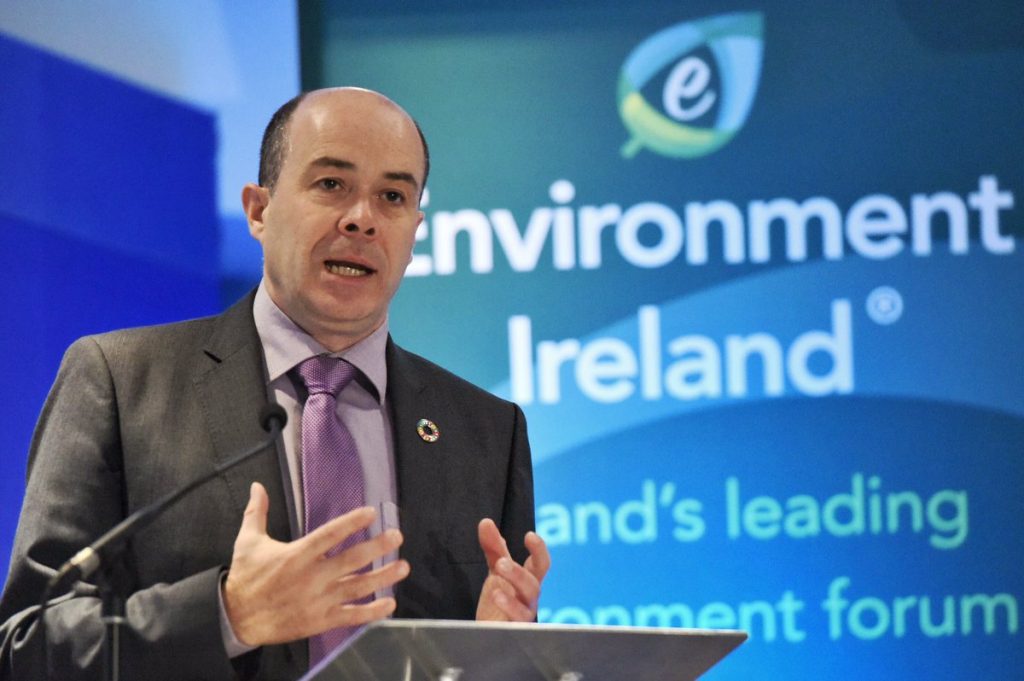Minister trying to water down Waste Reduction Bill, says environmental group

May 22nd, 2018
The Minister for the Environment is attempting to water down plans for a national deposit and return scheme (DRS) for bottles, environmental groups have warned.
The Oireachtas Environment Committee is set to vote this afternoon in private session on the wording of its report on the Waste Reduction Bill after holding several hearings in recent months.
According to Friends of the Earth Ireland, Denis Naughten, TD intends to propose an amendment to give him the discretion to introduce a DRS.
The current wording of the Bill states that it would be mandatory to bring in the scheme if the Bill is passed.
A previous draft of the Bill was seeking to introduce a 10c deposit on glass and plastic bottles, which would be refunded when the bottle would be brought back for recycling.
In countries where a system has been implemented, including the Netherlands, Sweden, and Finland, results have been positive with return rates reaching 80 to 95 per cent.
According to Oisin Coghlan, Director of the Friend of the Earth, the proposed amendment points to the Minister’s attempts to “dilute” the Bill to the “taste of vested interests resisting change” rather than supporting the public who “clearly want to see action”.
A recent survey by Coastwatch Ireland showed that 89 per cent of people surveyed believe that a deposit-return scheme is a positive step toward tackling waste.
Mr Coghlan also said that he is concerned that today’s committee meeting is taking place in private session, which he sees as an “undemocratic” move.
“If Minister Naughten believed in the merits of this case he’d put down an amendment to the Waste Bill, in public, at the next stage,” he added.

Minister Denis Naughten Photo: Environment Ireland.
Minister Naughten’s Position
In a statement, the Department for the Environment (DCCAE) said that the decision to hold the meeting in private session was the decision of the committee itself and that the Minister would have preferred that the vote was carried out in the open.
The statement goes on to say that the Minister believes more research should be carried out to find a model for Ireland that avoids affecting the existing waste collection system.
The introduction of a scheme would lead to an increase in household green bin collection charges of up to €1 per lift to make up for “valuable materials” such aluminium diverted from kerbside collection by a DRS, according to the department.
“This cost will be passed on to the householder to make up for lost revenue,” the statement continues. “This will in turn force collectors to make up for this lost revenue through increasing waste collection charges.”
“Without a complete understanding of the cost implications on the taxpayer, on employers, on retailers and on customers it would be financially reckless [for the Minister] to proceed with its introduction without proper scrutiny.”
The department said that, for this reason, the Minister proposes to bring in a pilot scheme to “provide evidence and therefore help inform future decisions”.
Mindy O’Brien, the Coordinator of VOICE, an environmental charity focused on tackling plastic pollution, said that producers, not consumers, should pay for packaging waste and that “adopting a DRS is a good first step”.
She added that Ireland is one of the cheapest EU countries for bottle producers to do business. “We need producers, such as Coca-Cola and Ballygowan, who place these bottles and cans onto the marketplace, to step up and help finance an Irish DRS,” she said.
“Producers get a sweet deal in Ireland as they pay only two-tenths of a cent per plastic bottle for the proper treatment of their containers while other EU countries require them to pay around one cent per bottle.”
Latte Levy
In its current draft, the Waste Reduction Bill also outlines plans for an outright ban on single-use non-recyclable plastics such as coffee cups and plastic cutlery by 2020.
This would, however, likely cause issue as coffee containers are currently counted as packaging under EU law and can only be subject to a charge rather than a full ban.
According to sources close to the Bill, the Committee’s report will consider an amendment to instead introduce a 15c levy for non-compostable cups and a 5c fee for compostable containers.
Last year, Minister Naughten called for a tax on all disposable coffee cups in a bid to reduce the volume of plastic waste.
The tax, known as the ‘latte levy’ would have seen a 15 cent additional cost applied to single-use takeaway cups to cut down their use.
However, the Minister recently announced that the proposed levy will not apply to compostable cups due to a large number of retailers moving toward their use on a larger scale.
[x_author title=”About the Author”]







